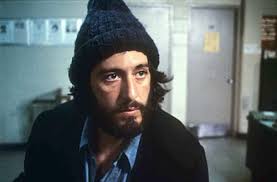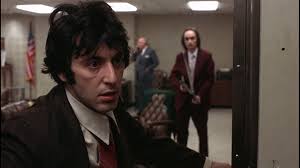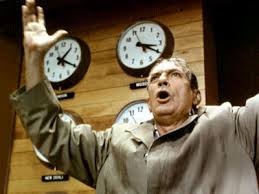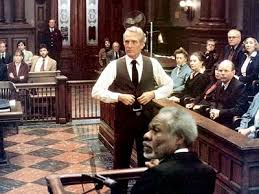One of my filmmaking heroes, Sidney Lumet, has passed away. As pretentious as this sounds, the man is everything I wish I could amount to (as if anyone would ever come to having a filmography like his). He knows everything there is to know about the filmmaking process, but most importantly of all, he was an "actor's director." He knew how to take a performer and have them appear as part of a visual image and illicit emotion from different generations of filmgoers. Lumet was already well-versed in live television when he went on to direct his first film, 12 Angry Men. He continued to make some fantastic movies, but he fit right in with the New Hollywood era of the 1970's, despite having been established beforehand. I'm going to talk about my favorite films of his, what they mean to me, as well as what the meant to audiences. Once again, I sit here a little saddened that we won't see another Lumet offering of social realism, but if anyone from the film industry could have passed on from this world knowing that they've left us with such memorable pieces of art, I hope Lumet's family and friends take comfort in the fact that he has left everyone with such landmark accomplishments in his craft.
12 Angry Men (1957)
"Suposin' you talk us all out of this, and the kid really did knife his father?"

On the set of 12 Angry Men, after the first couple of days of shooting, Henry Fonda (who was also the film's producer and was financing it out of his pocket) looked over the first time director's shoulder at the dailies and said "It's brilliant."
Fonda could've been talking about any number of things when he saw the footage. To start off, Reginald Rose's terse screenplay was based on his play (Rose was also producing the film out of his pocket alongside Fonda) and it is not just a courtroom drama, it's actually a thriller. On the hottest day of the year, twelve men debate over the law in concerns to a boy's fate. The film opens with us just hearing the judge explain the concept of reasonable doubt as we see the jurors reacting. They go into the deliberation room and they all say he's guilty except for one juror (#8, played by Fonda), a dissenter who creates tension with his heroic personality. Juror #8 is a true hero. As the film proceeds in real-time, we come to learn that he picked up on elements of the case that might create reasonable doubt (the switch-blade scene).
Throw in the cinematography of Boris Kaufman (On the Waterfront), masterful editing, and twelve simultaneous character arcs... you have one of the finest directorial debuts of all time. What a cast (Martin Balsam, John Fiedler, Lee J. Cobb, E.G. Marshall, Jack Klugman, Edward Binns, Jack Warden, Joseph Sweeney, Ed Begley, George Voskovec, and Robert Webber). They all are so believable in defending their points of view whether it is wanting to leave the room to go to a ballgame or actually sticking to pure logic.
Still, no matter what, I go back to that racism scene. Where one juror says the defendant committed the crime because that's "how his people are." The other jurors all silently get up and face away from him until one juror (who actually still feels that the boy is guilty) looks up at the racist juror and tells him to "shut up and never speak another word." It takes skillful directing to make that believable.
Serpico (1973)
"The reality is that we do not wash our own laundry- it just gets dirtier."

After making a few more films (The Pawnbroker, Fail-Safe, The Fugitive Kind, A View from a Bridge, Long Day's Journey Into Night), Lumet teamed with one of the stars of the New Hollywood era, Al Pacino (fresh off the success of The Panic in Needle Park and The Godfather) and tackled the true story of a police officer who fought against corruption in his own department at the risk of being betrayed by his comrades. Lumet and Pacino both came from a theater schooling so they loved to rehearse and although he might get frustrated with Pacino (because Pacino would remain in character all day), the two ultimately enjoyed the experience and would work with each other again in two years on Dog Day Afternoon. Come to think of it, Pacino had such a successful 1970's and two of those success were with Lumet.
With Serpico, Lumet creates inspiration out of a truly gritty and down-to-Earth story. It is a character study of a man facing a lot. Serpico himself is flawed, but he still tries to overcome his issues so he can try to make a difference. Ultimately inspiring, Pacino's portrayal of Frank Serpico remains a high moment of his career.
Murder on the Orient Express (1974)
"Only by interrogating the other passengers could I hope to see the light, but when I began to question them, the light, as Macbeth would have said, thickened."

In between making two films based in emotionally-gripping social realism, Lumet directed an adaptation of an Agatha Christie novel that was a nod to older types of mystery films. Featuring an all-star supporting cast (Lauren Bacall, Sean Connery, Ingrid Bergman, Michael York, Vanessa Redgrave, Jacqueline Bisset, Richard Widmark, John Gielgud, Anthony Perkins, Martin Balsam, Rachel Roberts, Wendy Hiller, Denis Quilley, Colin Blakely, Jean-Pierre Cassel, and George Coulouris), the film is an old-fashioned whodunit where a murder takes place on a train, making everyone on board a suspect. Enter Hercule Poirot (Albert Finney) who attempts to solve the crime (the film led to a sequel called Death on the Nile, but Finney's portrayal here remains the best version of the character).
Lumet has worked with a ton of characters before in 12 Angry Men and in terms of every person having a story-arc, this is no exception. Here, everyone over-acts like they would in an older film and thanks to the style of cinematography, it all feels like one of those Golden Age of Hollywood movies. The scene where Finney's character gathers everyone in the car and then tells them all to be quiet as he points out who the culprit is... how expertly gripping that ends up being.
Dog Day Afternoon (1975)
"Sal, Wyoming is not a country."

The film opens with such naturalistic shots of New York City. They are necessary. They establish that is a film set in New York, but not the New York of Woody Allen or Martin Scorsese, a New York that is actually perhaps more real than one is used to seeing on film.
Now, Day Day Afternoon is about two men (Al Pacino as Sonny, John Cazale as Sal) who take a bank hostage and demand money. Things start to go wrong and a hostage negotiator (Charles Durning) shows up. Now, for those that haven't seen the movie, stop reading, because I'm going to spoil a huge surprise; the surprise that everyone talks about when they see this film. It turns out that Sonny is stealing money so he can pay for his gay lover's sex change operation. Now, today we might be accepting of such a plot-twist, but imagine being back in 1975. One might not readily say "oh... so this street-smart, Vietnam vet, married man is gay... I can identify with that." Thing is and the reason why the movie is not the least bit controversial, is because we do identify with Sonny.
Much like the public and the hostages themselves, we see how Sonny is willing to do anything for someone he loves. We get swept up in the emotion, the excitement, and even the humor. Like 12 Angry Men and Murder on the Orient Express, this film is mostly constricted to a small area (a bank and the sidewalk). Lumet and screenwriter Frank Pierson craft such a thrilling and moving film and it all takes place in a familiar setting, but it's that familiarity that Lumet plays with. We want to see the bank-robber fight the authorities and go out shooting. Lumet and Pierson masterfully play with our expectations by actually grounding this in a reality we are familiar with.
Network (1976)
"I don't know how I feel. I'm grateful I can feel anything."

I've yet to see film go back-and-forth on how sentimental it can and cannot be. Network follows a newscaster who is fired because let's face it (and this is true even now) no one watches the news. So instead, on his last day on air, Howard Beale (the amazing Peter Finch) gets up in front of the cameras and starts shouting about everything that is wrong with the world. Beale's insane rantings makes him get re-noticed and his honest descent into madness actually makes a lot of sense when you see how he views the world and how right he is.
Lumet and screenwriter Paddy Chayefsky then smoothly go behind-the-scenes and show us Max (William Holden) and Diana (Faye Dunaway), two people who manage the show. They are having a cheerless love affair and the scene where they break up may rank as the film's strongest and most beautifully directed moment. The film deals with so many ideas and is at times chilling, but no moment is ever placed into the category of a singular feeling. So much is said through these characters and yet we truly form our own conclusions about this movie despite how it predicted the downfall of widespread quality television. There are also some fantastic supporting turns from Ned Beatty, Robert Duvall, and Beatrice Straight.
The Verdict (1982)
"I've no sympathy for you."

While rehearsing for The Verdict, Lumet and the actor Paul Newman were riding in a car after a day's work and Newman knew something was up with Lumet. Newman asked what the problem was and Lumet said that during rehearsals, Newman was holding back. Newman mentioned that he struggled with alcoholism, like his character Frank Galvin, and was having a difficult time handling the subject matter. Then on set, come a very important scene, Newman said, "Fuck it, let it all show." The scene was when Newman's character sips from a shot glass as he shakes.
This is my favorite performance by Newman. He conveys this man who is just screaming on the inside and that scene where sips and shakes remains one of the most unintentionally haunting cinematic moments I've ever experienced. Screenwriter David Mamet worked with Lumet to provide the director with another deeply flawed man. Alongside Jack Warden, Charlotte Rampling, James Mason, and Milo O'Shea, Newman truly does let everything he is feeling show under Lumet's skillful direction. The film might be slow moving, but its hardened take on a malpractice lawsuit makes it the Michael Clayton of its time.
Before the Devil Knows You're Dead (2007)
"Right now, I got to get into character."

In 2005, Lumet accepted the Academy Award for Life Achievement. This was his first Oscar despite having been nominated for 12 Angry Men, Dog Day Afternoon, Network, The Verdict, and for his screenplay for Prince of the City. Normally in the film industry, lifetime achievement awards are given to those whose best work is behind them and they don't really have much more to say. Leave it to Sidney Lumet to win that award and then end his career in 2007 with one of his most gripping films.
The film follows two brothers (Philip Seymour Hoffman and Ethan Hawke) who need money so bad that they decide to rob their parents' jewelry store. When the mother (Rosemary Harris) is killed, the father (Albert Finney) goes on a path of vengeance while the brothers try to cover up the accident. Hoffman and Hawke have chemistry that makes you feel as if they really are brothers despite not looking much alike of course. Finney gives his most heartbreaking performance since Big Fish as a man who just wants to find the truth, but might not like the answers. The other stars of the film (Marisa Tomei, Amy Ryan, Brian F. O'Byrne, Michael Shannon) alongside the stars I just mentioned, achieve a level of depth that is a trademark of Lumet's characters. The film just grabs you and doesn't let go.
Written by first-time screenwriter Kelly Masterson, it's suiting that such a well-crafted film be both Lumet's last and another man's first. Lumet also authored a phenomenal memoir called Making Movies that is a must-read for everyone. I hope people take the time to really dig deep into this man's filmography. It's full of experiences that you shouldn't just want to have, but you need to have. Lumet found something that many filmmakers struggle to find- an accurate representation of humanity.





